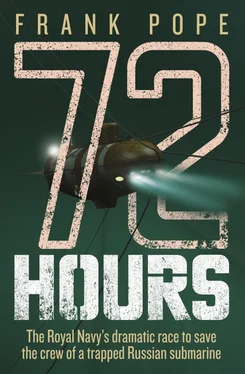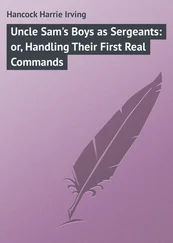‘Jesus,’ said Cave. ‘Look at this.’ He was kneeling on top of the workshop they’d identified as the only place to site the deployment crane. It wasn’t ideal, since the crane would have to be at full stretch to reach over the side, but it was all they had. But Cave was holding up a large flake of rust, poking at more loose fragments that lay beneath. The whole roof was peeling away. It didn’t look as if it was going to be able to take anything like the loads they were about to exert on it, and there was no way for them to check. Every other vessel they’d used on exercise had been taken through rigorous strength testing. Now, just when the stakes were at their highest, they were going to have to weld their crane on to not much more than rust.
Saturday, 6 August
SS + 51 h 40 mins
08.10 UK – 11.10 Moscow – 20.10 Kamchatka
Elizovo Airport, Petropavlovsk-Kamchatsky
At 20.10 there was a roar from the darkening skies above the Elizovo airfield. The noise grew and grew until suddenly the enormous belly of the US Air Force’s C5 dropped out of the low cloud. Its drooping wings were reaching towards the ground, which it touched down only seconds later. The aircraft didn’t appear to be slowing down at all, its inertia carrying it further and further down the runway until it had all but disappeared. Riches was about to arrange a lift over to them when someone noticed it had begun taxiing back towards the UK team. At last, some good news, he thought. They were going to direct the C5 to park nearby, allowing easy coordination. But the huge American plane rumbled past, crossing the taxiway on which the C17 stood and on, eventually disappearing behind some trees and bushes. They were not allowed to stop until they’d got in front of the airport’s commercial terminal buildings, two miles away.
Riches turned to the Russian escorts and asked them to take him over there in one of their vehicles. He was anxious to go and see them immediately to present his case to their senior officer, to try to persuade him to loan their K-loader when it arrived. Commander Kent Van Horn, the Commanding Officer of the US Navy Deep Submergence Unit, should be on board. The two men knew each other from the recent NATO exercise in the Mediterranean, so there was a chance he’d listen. But the Russians just shook their heads.
‘ Niet .’
Until the C5 had cleared customs, there would be absolutely no contact with the American crews, Riches was told. Worse still, there was some talk that he would not be allowed to see them at all. He tried everything. He talked calmly to the guards, reasoning that this delay could be costing the lives of their countrymen. He demanded to see superior officers. He tried veiled threats of future repercussions.
Every time the same reply came back: ‘Just wait.’
Commander Kent Van Horn sprang to his feet as soon as the C5 stopped, and was waiting by the hatch when the crewmen broke the seals and swung it open. He was poised to leap out into the waiting fleet of transport vehicles that would rush his men down to the port and on to the vessel to which they’d been assigned. But his square jaw fell open when he saw what awaited him on the tarmac. There was not a vehicle in sight. Instead, walking up to the unfolding aircraft’s steps was a scrappy group of around eight people, some in uniform, some not. And rather than looking glad to see them, the expressions of the military men were sour as he made his way down the stairs and across Russian soil to meet them.
Van Horn must have appeared as the archetypal American to the Russian welcoming party – 6 foot 3 inches tall, broad, with a prize-fighter’s jaw and gleaming white teeth. He was still in his trainers from the flight, and shook hands with the man who appeared to be the senior Russian officer. He was greeted by a few gruff-sounding words in Russian, accompanied by gestures towards the aircraft. At his side, an attractive girl in her twenties in civilian dress translated into thickly accented English.
‘You need to get back on the plane,’ she said.
Van Horn protested, but was told that until the correct checks had been made, no one on the plane was allowed to get off the aircraft. Realising there was nothing he could do but cooperate, he walked back up the stairs and into the C5, followed by a handful of the Russians.
‘We need to see your passports,’ the translator said, following another burst of harsh-sounding language from the Russian officer when they’d got back inside. Van Horn was incredulous. This was the last thing he had expected.
‘Not everyone has them,’ he replied. ‘We have military IDs instead.’
The Russian accepted this, and one by one the American crew filed past to present their IDs. With each of the 36 men on board, the Russian compared the photo with the face, then wrote down the name on a clipboard. Van Horn was itching with impatience – the whole procedure struck him as a monumental waste of time, given the situation. They’d flown direct from the US across the entire Pacific, refuelling the aircraft twice mid-air in order to shave off every possible minute, and now this.
Then the Russian officer demanded the same as he had of the UK team – a complete list of all equipment and its value. The request had caused enough problems with one C17 load of gear – for Van Horn to do the same thing with the contents of a C5 was a huge task. In many cases ascribing a value was also practically impossible – much of the kit that they carried was custom-made in the Navy workshops, or at least customised to such an extent that its worth was very difficult to gauge. Once more van Horn had to swallow his frustration and agree. He took one of the loading manifests and snatched figures out of the air to reach a wild estimate of the total. Once again, the customs man made him sign to guarantee that he would take it all out of the country when they were finished.
Behind him in the plane, frantic calls were being made to try to speed things along. The US Naval Attaché in Moscow eventually got through to Vice-Admiral Avdoshin, and finally, at 22.10, the C5 was cleared.
Saturday, 6 August
SS + 53 h 40 mins
10.10 UK – 13.10 Moscow – 22.10 Kamchatka
Petropavlovsk-Kamchatsky
Now the waiting was eating away at everyone. The lack of urgency from the Russians seemed doubly acidic given that seven of their fellow servicemen were enduring a slow, frozen suffocation. The looming crisis seemed to be making them slower and more bureaucratic. The central government was apparently taking this seriously – a few hours earlier the team had heard that Putin had despatched the Defence Minister, Sergei Ivanov, to Kamchatka – but progress on site was still glacial.
All of the team’s hard-won speed reaching Petropavlovsk had been wasted. It remained to be seen if the entire mission would be wasted too. The thought of facing the television cameras with that news made Riches’ stomach tighten. Beyond that, he could only have imagined how such a failure might feel. He could rationalise it all he liked, deflecting the blame onto others, but deep down he’d feel it had been his responsibility. The only thought that loosened the knot in his belly was that the advance party was down at the ship making preparations there.
The state of the vessel didn’t sound encouraging, but at least they were moving ahead where they could, planning and preparing the decks. All that was needed now was some equipment to put on them.
The team had congregated beneath the wings of the C17, and were drinking cups of tea and coffee to pass the time. Gold had instinctively turned on his phone when he arrived, and to his surprise found that it had picked up a signal. He called Susan and shared his frustration. They were in Russia, but paralysed. He’d been elated at the thought that the UK team was going to be first in line to pull off this rescue, but now their lead had evaporated. After he’d hung up and was back kicking his heels under the wing, he noticed some activity around one of the flatbed trucks. He went over to have a look, only to find several soldiers wrestling to change a flat tyre. Gold could hardly believe the state of the truck. The wooden deck of the flatbed was totally rotten with holes everywhere.
Читать дальше












